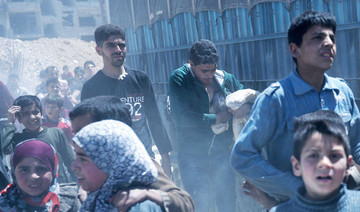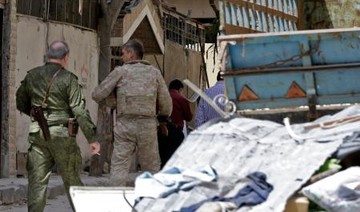NEW YORK: There are “reasonable grounds” to believe the Syrian Arab Air Force was responsible for a chemical weapons attack on Douma almost five years ago, the Organization for the Prohibition of Chemical Weapons said on Friday.
Its Investigation and Identification Team, which is responsible for identifying the perpetrators of such attacks in Syria, concluded that on the evening of April 7, 2018, at least one helicopter belonging to the elite Syrian “Tiger Forces” unit dropped two yellow cylinders filled with toxic chlorine gas onto two residential buildings in the city.
Fernando Arias, the OPCW’s director-general, said: “The world now knows the facts — it is up to the international community to take action, at the OPCW and beyond.”
The Douma attack resulted in the confirmed deaths of 43 identified civilians. Some estimates put the true death toll at 50. At least 100 people were injured.
The IIT said that it reached its conclusion on the basis of “reasonable grounds,” which is the standard of proof consistently adopted by international fact-finding bodies and commissions of inquiry.
The IIT report, the team’s third, said that investigators, analysts and several external independent experts scrutinized the physical evidence of the attack, which included environmental and biomedical samples, witness statements and other verified data, such as forensic analyzes and satellite images.
The OPCW said: “The IIT considered a range of possible scenarios and tested their validity against the evidence they gathered and analyzed to reach their conclusion: That the Syrian Arab Air Forces are the perpetrators of this attack.”
UN spokesperson Stephane Dujarric told Arab News: “It’s sad that in the 21st century we need to repeat this, but the use of chemical weapons anywhere, by anyone, under any circumstances is intolerable.
“Impunity for the use of chemical weapons is also unacceptable and it’s imperative that those who have used chemical weapons are identified and held accountable.”
He reiterated calls for the full implementation of Security Council Resolution 2118, which was unanimously adopted in September 2013 after a UN investigation confirmed the use of chemical weapons against civilians in a Damascus suburb the previous month. Images of the victims, including children, suffocating after breathing in a nerve agent caused outrage worldwide.
The resolution called on the Syrian regime to destroy its stockpiles of chemical weapons by mid-2014 and set out punitive measures in the event of non-compliance. It also banned Syrian authorities from using, developing, producing, acquiring, stockpiling or retaining any chemical weapons, or transferring them to other states or non-state actors.
In October 2013, the Syria regime submitted to the OPCW a formal initial declaration of its chemical weapons program, including a plan for the destruction of stockpiles.
Almost 10 years later, the UN’s disarmament chief, Izumi Nakamitsu, continues to assert that the regime’s declaration cannot be considered accurate or complete. She said “gaps, inconsistencies
and discrepancies” were identified that continue to cast doubt on the true extent of the destruction of chemical weapons by the regime.
Dujarric called on the Syrian government to cooperate fully with the OPCW. The organization has for months complained that its attempts to schedule talks in Damascus about the issue have been blocked by the “continued refusal” of Syrian authorities to issue an entry visa for one member of its Declaration Assessment Team. The Syrian government accuses the team of being biased and unprofessional.
Dujarric reiterated the full support of the UN for “the integrity, the professionalism, the impartiality, the objectivity and the independence of the work of the OPCW.”
The IIT is a fact-finding entity, not a prosecutorial or judicial body, and does not make recommendations for future action, which is an issue for the policy-making bodies of the OPCW.
Syrian regime guilty of chemical attack on Douma, weapons watchdog concludes
https://arab.news/c3w87
Syrian regime guilty of chemical attack on Douma, weapons watchdog concludes

- Organization for the Prohibition of Chemical Weapons said it is up to the international community to take action over the 2018 attack in which 50 people died
- Stephane Dujarric once again called on the Syrian government to fully comply with Security Council Resolution 2118 and destroy its chemical weapons stockpiles
US working to get American doctors out of Gaza, White House says
The Biden administration has been warning Israel against a major military ground operation in Rafah
WASHINGTON: The Biden administration is working to get US doctors out of Gaza, White House Press Secretary Karine Jean-Pierre said on Wednesday, as fighting intensified in the seaside enclave.
A group of American doctors from the Palestinian American Medical Association told the Washington Post this week that they were stuck in Gaza after Israel closed the border crossing in the southern city of Rafah.
“We’re tracking this matter closely and working to get the impacted American citizens out of Gaza,” Jean-Pierre said.
Jean-Pierre said the United States was engaging directly with Israel on the matter.
The Biden administration has been warning Israel against a major military ground operation in Rafah, but Jean-Pierre said efforts to get the doctors out are continuing regardless of what happens there.
“We need to get them out. We want to get them out and it has nothing to do with anything else,” she said.
Israeli troops battled militants across Gaza on Wednesday, including in Rafah, which had been a refuge for civilians, in an upsurge of the more than 7-month-old war that has killed tens of thousands of Palestinians.
Gaza’s health care system has essentially collapsed since Israel began its military offensive there after the Oct. 7 cross-border attacks by Palestinian Hamas militants on Israelis.
Humanitarian workers sounded the alarm last week that the closure of the Rafah and Kerem Shalom crossings into Gaza could force aid operations to grind to a halt.
The Israeli assault on Gaza has destroyed hospitals across Gaza, including Al Shifa Hospital, the Gaza Strip’s largest before the war, and killed and injured health workers.
Egypt warns against consequences of Israeli escalation in Gaza

- During talks with Ayman Al-Safadi and Fuad Hussein, FM Shoukry said that there would be negative repercussions for regional stability if Israel continued to escalate its activities in Gaza
- Discussions in Manama took place on the sidelines of an Arabian foreign ministers’ meeting being held in preparation for the Arab Summit
CAIRO: Egypt’s Foreign Minister Sameh Shoukry has warned of dire consequences as a result of Israel escalating its activities in the Gaza Strip.
During talks with his Jordanian and Iraqi counterparts, Ayman Al-Safadi and Fuad Hussein, he also said there would be negative repercussions for the security and stability of the whole region.
The discussion in Manama on Wednesday took place on the sidelines of an Arabian foreign ministers’ meeting being held in preparation for the Arab Summit.
Shoukry talked about Egypt’s efforts to reach an immediate, comprehensive and lasting ceasefire in Gaza and its call for allowing immediate delivery of humanitarian aid.
He also stressed his country’s categorical rejection of any attempts to displace Gazans or kill the Palestinian cause.
He underlined the need to stop targeting civilians, halt Israeli settler violence, and allow aid access in adequate quantities “that meet the needs of our Palestinian brothers.”
During the meeting, Shoukry also reaffirmed Cairo’s support for the stability of Iraq and Jordan and emphasized the importance of implementing directives from the three countries’ leaders to boost cooperation within the framework of the tripartite mechanism.
He said Egypt viewed tripartite cooperation as a way to link the interests of the three countries and maximize common benefits. The discussion also underlined the importance of putting into effect agreed joint projects as soon as possible.
During a separate meeting with Iraqi minister Hussein, Shoukry reiterated the directives of President Abdel Fattah El-Sisi to develop relations between the two countries in various fields.
The Iraqi minister highlighted close historical ties with Egypt that required continued coordination on the various challenges plaguing the region. Hussein also hailed the key role played by Egypt to bring about an end to the crisis in Gaza.
Houthis claim 2 attacks on ships in Red Sea

- Houthi military spokesman Yahya Sarea said that the militia’s naval forces launched an “accurate” missile strike on the US Navy destroyer USS Mason in the Red Sea
- Statement comes a day after US Central Command said that the USS Mason shot down an incoming anti-ship ballistic missile launched by the Houthis
AL-MUKALLA: Yemen’s Houthi militia claimed responsibility on Wednesday for two drone and missile attacks on a US warship and a commercial ship in the Red Sea, vowing to continue striking ships in international seas, mostly near Yemen’s borders, in support of Palestinians.
In a televised broadcast, Houthi military spokesman Yahya Sarea said that the militia’s naval forces launched an “accurate” missile strike on the US Navy destroyer USS Mason in the Red Sea, as well as a combined attack on the Destiny in the Red Sea. Sarea did not specify when Houthis forces assaulted the two ships, or if the militia caused any human casualties or damage. The statement comes a day after US Central Command said that the USS Mason shot down an incoming anti-ship ballistic missile launched by the Houthis from areas under militia control in Yemen on Monday evening.
According to marinetraffic.com, which provides information on ship locations and identities, the Destiny is a Liberian-flagged bulk carrier that left Bangladesh’s Port of Chittagong on March 31 and landed at the Saudi Red Sea port of Jeddah on April 17. The Houthis said they attacked the ship when it reached Israel’s Eilat on April 20, defying militia warnings to ships sailing the Red Sea to avoid the port.
The Houthis have sunk one ship, seized another and launched hundreds of ballistic missiles, drones, and explosive-laden drone boats at International commercial and naval ships in the Gulf of Aden, the Red Sea, and, more recently, the Indian Ocean. The militia claimed its strikes were intended to push Israel to cease its blockade of the Gaza Strip, and that they targeted US and UK ships after the two nations blasted Houthi-controlled regions of Yemen.
On Tuesday, Houthi media said that jets from the US and the UK had launched four strikes on Hodeidah airport in the Red Sea city, the second round of airstrikes on the same airport this week. The US and UK replied to the Houthi Red Sea campaign by unleashing hundreds of airstrikes on Sanaa, Saada, Hodeidah and other Houthi-controlled Yemeni regions. According to the two nations, the strikes prevented many Houthi missile, drone, or drone boat assaults on ships in international seas while significantly weakening Houthi military capabilities.
The US-led Combined Maritime Forces said on Tuesday that Lebanon and Albania joined the international marine coalition as the 44th and 45th members, respectively. “It is a pleasure to welcome both Lebanon and Albania to the Combined Maritime Forces,” US Navy Vice Admiral George Wikoff, the CMF commander, said in a statement. The Bahrain-based CMF is made up of five task teams that protect major maritime waterways such as the Red Sea and the Bab Al-Mandab Strait.
Israeli defense chief challenges Netanyahu over post-war Gaza plans

- Statement by Defense Minister Yoav Gallant marked the most vocal dissent from within Israel’s top echelon against Netanyahu during seven-month-old conflict
JERUSALEM: Israeli Prime Minister Benjamin Netanyahu was publicly challenged about post-war plans for the Gaza Strip on Wednesday by his own defense chief, who vowed to oppose any long-term military rule by Israel over the ravaged Palestinian enclave.
The televised statement by Defense Minister Yoav Gallant marked the most vocal dissent from within Israel’s top echelon against Netanyahu during a seven-month-old and multi-front conflict that has set off political fissures at home and abroad.
Netanyahu hinted, in a riposte which did not explicitly name Gallant, that the retired admiral was making “excuses” for not yet having destroyed Hamas in a conflict now in its eight month.
But the veteran conservative premier soon appeared to be outflanked within his own war cabinet: Centrist ex-general Benny Gantz, the only voting member of the forum other than Netanyahu and Gallant, said the defense minister had “spoke(n) the truth.”
While reiterating the Netanyahu government’s goals of defeating Hamas and recovering remaining hostages from the Oct. 7 cross-border rampage by the faction, Gallant said these must be complemented by laying the groundwork for alternative Palestinian rule.
“We must dismantle Hamas’ governing capabilities in Gaza. The key to this goal is military action, and the establishment of a governing alternative in Gaza,” Gallant said.
“In the absence of such an alternative, only two negative options remain: Hamas’ rule in Gaza or Israeli military rule in Gaza,” he added, saying he would oppose the latter scenario and urging Netanyahu to formally forswear it.
Gallant said that, since October, he had tried to promote a plan to set up a “non-hostile Palestinian governing alternative” to Hamas — but got no response from the Israeli cabinet.
The format of his broadside, a pre-announced news conference carried live by Israeli TV and radio, recalled Gallant’s bombshell warning in March 2023 that foment over a judicial overhaul pursued by Netanyahu was threatening military cohesion.
At the time, Netanyahu announced that Gallant would be fired — but backed down amid a deluge of street demonstrations. Some defense analysts believe Gallant’s prediction was borne out by Hamas’ ability to blindside Israeli forces a few months later.
Asked on Wednesday whether he was worried he may again face being ousted, Gallant said: “I’m not blaming anyone. In a democratic country, I believe, it’s appropriate for a person, especially the defense minister who holds a position, to make it public.”
Gallant’s Gaza criticism recalled that of Israel’s chief ally, the United States, which has sought to parlay the war into a role for the internationally backed Palestinian Authority (PA), which wields limited governance in the occupied West Bank.
Netanyahu has refused this, describing the PA as a hostile entity — and repeated this position in a video statement he issued on social media within an hour of Gallant’s remarks.
Any move to create an alternative Gaza government requires that Hamas first be eliminated, Netanyahu said, finishing with the demand that this objective be pursued “without excuses.”
Netanyahu’s ruling coalition includes ultra-nationalist partners who want the PA dismantled and new Jewish settlements in the Gaza Strip. Those partners have at times sparred with Gallant, a member of Netanyahu’s Likud party, over policy.
Netanyahu has said Israel would retain overall security control over Gaza after the war for the foreseeable future. He has stopped short of describing this scenario as an occupation — a status Washington does not want to see emerge — and has signalled opposition to Israelis settling the territory.
Over the last week, Israeli ground forces have returned to some areas of northern Gaza that they overran and quit in the first half of the war. Israel describes the new missions as planned crackdowns on efforts by Hamas holdouts to regroup, while Palestinians see evidence of the tenacity of the gunmen.
Briefing reporters on Tuesday, chief military spokesperson Rear Admiral Daniel Hagari was asked whether the absence of a post-Hamas strategy for Gaza was complicating operations.
“There is no doubt that an alternative to Hamas would generate pressure on Hamas, but that’s a question for the government echelon,” he responded.
Blinken says Israel needs a clear and concrete plan for Gaza’s future

- “We do not support and will not support an Israeli occupation. We also of course, do not support Hamas governance in Gaza...” Blinken said
- Israel says it intends to keep overall security control and has baulked at proposals for the Palestinian Authority to take charge
KYIV: Israel needs a clear and concrete plan for the future of Gaza where it faces the potential for a power vacuum that could become filled by chaos, US Secretary of State Antony Blinken said on Wednesday.
Washington and its ally Israel say Hamas cannot continue to run Gaza after militants from the group ignited the conflict with attacks on southern Israel that killed 1,200 people on Oct. 7.
“We do not support and will not support an Israeli occupation. We also of course, do not support Hamas governance in Gaza... We’ve seen where that’s led all too many times for the people of Gaza and for Israel. And we also can’t have anarchy and a vacuum that’s likely to be filled by chaos,” Blinken said during a press conference in Kyiv.
The US top diplomat has held numerous talks with Israel’s Arab neighbors on a post-conflict plan for Gaza since Israel vowed to root out Hamas from the Palestinian enclave more than seven months ago.
But Israel says it intends to keep overall security control and has baulked at proposals for the Palestinian Authority, which governs with partial authority in the Israeli-occupied West Bank, to take charge.
“It’s imperative that Israel also do this work and focus on what the future can and must be,” Blinken said. “There needs to be a clear and concrete plan, and we look to Israel to come forward with its ideas.”




















